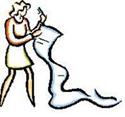|

JOAN’S BLOG – THURSDAY, SEPTEMBER 11, 2008 – ASKING FOR HELP
There is no doubt that when Alzheimer’s Disease strikes, many people around you flee . Those you considered friends; those relatives you may have considered close. You often feel abandoned, alone . Those you considered friends; those relatives you may have considered close. You often feel abandoned, alone , hurt, and probably angry. I hear the same story countless times – “We used to be friends. We went everywhere together. They never call. They never visit.” There are many reasons for the “Alzheimer Flight”. People do not know what to say , hurt, and probably angry. I hear the same story countless times – “We used to be friends. We went everywhere together. They never call. They never visit.” There are many reasons for the “Alzheimer Flight”. People do not know what to say or how to act around a person with AD (which is one of the reasons I am campaigning so hard to educate the public about the disease); the person with AD may not be able to participate in the activities or how to act around a person with AD (which is one of the reasons I am campaigning so hard to educate the public about the disease); the person with AD may not be able to participate in the activities they and their friend previously enjoyed; the “friends” may not know how to respond to repeated questions or hearing the same story multiple times. (Click here to read more on the socialization topic that was discussed in a previous blog.) Now that you need their physical and emotional help more than ever, they are absent they and their friend previously enjoyed; the “friends” may not know how to respond to repeated questions or hearing the same story multiple times. (Click here to read more on the socialization topic that was discussed in a previous blog.) Now that you need their physical and emotional help more than ever, they are absent . .
Whatever the reasons or excuses for this “Alzheimer Flight”, there are still many friends and relatives, and simple acquaintances, who are more than willing to lend a hand . All you have to do is ask . All you have to do is ask . That is extremely difficult for most of us. We don’t want to burden others with our problems. We don’t want to interfere with their busy lives. Many of us, especially the male spousal caregivers I have met, feel it is their responsibility to do it all themselves. . That is extremely difficult for most of us. We don’t want to burden others with our problems. We don’t want to interfere with their busy lives. Many of us, especially the male spousal caregivers I have met, feel it is their responsibility to do it all themselves.
So let’s say you manage to overcome your discomfort of asking for help. How do you do it? Did you know that there is a knack for asking and receiving exactly what you need? Very often, people will say – “Let me know if I can help you.” You don’t call them. They don’t call you. You’re swamped with caregiving, household, and often work duties, and still have no help. and still have no help.
Here is a little secret from Dana Reeve (who tragically died less than two years after her husband), wife of Christopher Reeve (who tragically died less than two years after her husband), wife of Christopher Reeve , who was left paralyzed after a riding accident. BE SPECIFIC. In the first months after the accident, Dana was overwhelmed with the amount of organization, paperwork, and physical needs of her husband. Yes, I know they had the money and resources we do not, but there was still a tremendous amount on her shoulders. She made a long list , who was left paralyzed after a riding accident. BE SPECIFIC. In the first months after the accident, Dana was overwhelmed with the amount of organization, paperwork, and physical needs of her husband. Yes, I know they had the money and resources we do not, but there was still a tremendous amount on her shoulders. She made a long list  of things that needed doing, from making phone calls to insurance companies to equipment supply houses to baby sitting her child. When someone asked if they could help, she read an item from the list, and asked them to do it. It got done. of things that needed doing, from making phone calls to insurance companies to equipment supply houses to baby sitting her child. When someone asked if they could help, she read an item from the list, and asked them to do it. It got done.
When someone offers to help, tell them thank you – “Please do this one specific item on my list for me.” Such as - “Would you take these packages to the post office  ?” “Please call ?” “Please call these three companies and compare prices on wheelchairs.” these three companies and compare prices on wheelchairs.”
As you know, this website is now a full time job for me . I love doing it, but since it's a non paying job, I am in the process of writing workshops for speaking engagements that will generate income. And I am writing a book. And I am doing all of the driving . I love doing it, but since it's a non paying job, I am in the process of writing workshops for speaking engagements that will generate income. And I am writing a book. And I am doing all of the driving (which Sid never misses an opportunity to remind me I brought on myself by insisting he stop driving), all of the insurance, repair, and medical phone calls; and trying to keep him safe and healthy. And and and and…………and. So one day, I asked, in a blog, for one of my readers to organize the caregiver tips for me, so I could put them into a new section on the website, and in a minute, I received an e-mail offer; within days, it was done. I was amazed. She then organized the “Where are you From?” discussion into a table that will be the basis for the “Connect with New Members” section. (which Sid never misses an opportunity to remind me I brought on myself by insisting he stop driving), all of the insurance, repair, and medical phone calls; and trying to keep him safe and healthy. And and and and…………and. So one day, I asked, in a blog, for one of my readers to organize the caregiver tips for me, so I could put them into a new section on the website, and in a minute, I received an e-mail offer; within days, it was done. I was amazed. She then organized the “Where are you From?” discussion into a table that will be the basis for the “Connect with New Members” section.
If unsolicited offers come in, grab them! I received an e-mail from a friend who offered to organize all of my blogs into Adobe format, which I need done for another project.
Many of you have told of wonderful neighbors who are there to help you when you need it, whether it is to bring in the trash cans , shovel the snow, or visit with your spouse for an hour. , shovel the snow, or visit with your spouse for an hour.
Some people will disappoint you , but there is nothing you can do about that. It makes you more appreciative of the generous ones. , but there is nothing you can do about that. It makes you more appreciative of the generous ones.
It has been as difficult for me as for many of you, to ask for help when I need it, but I am learning. Slowly, but I am learning.
Please share your stories of asking and receiving, or perhaps, not receiving, the help you need on the Message Board Topic: Asking for help.
Feedback to joan@thealzheimerspouse.com |





